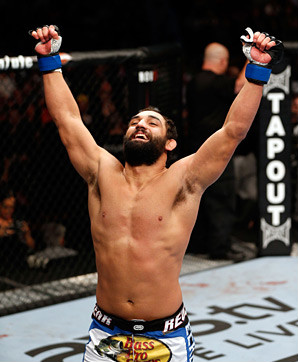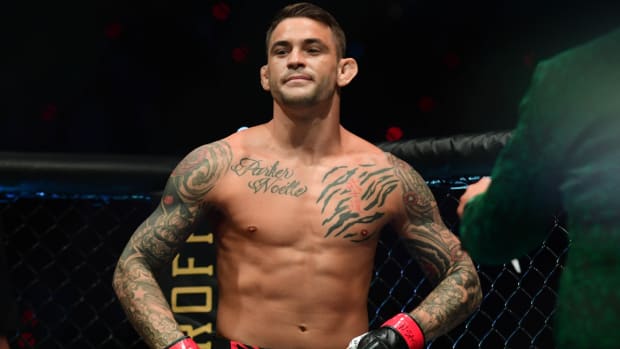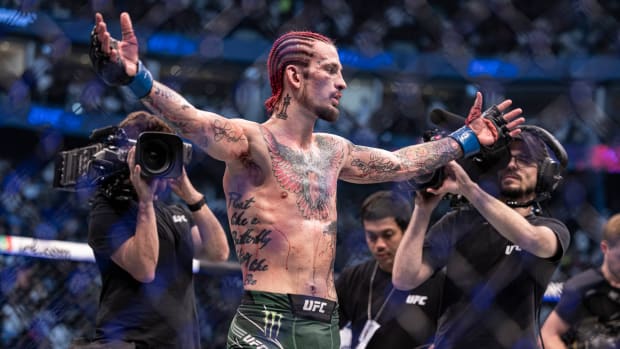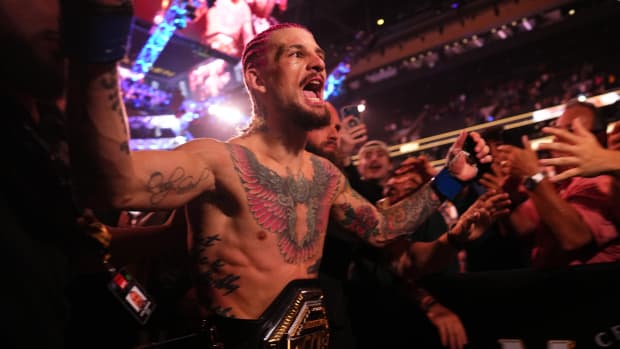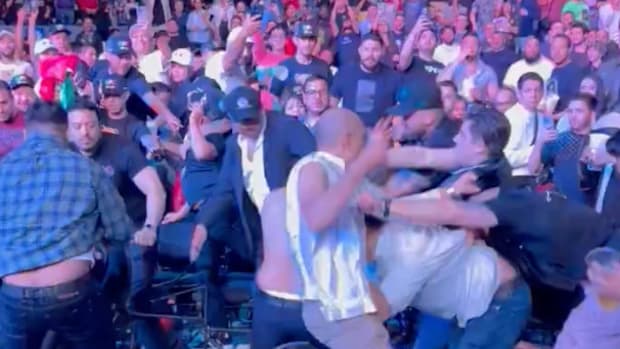Emptying out the MMA mailbag
That's a nice, noble image to disseminate, and maybe there was some truth to it at some point in the short history of MMA. But these days the sport -- especially within its leading promotion, the UFC -- is doing things much the way boxing does. And while that makes purists like me squirm, it's not necessarily a bad thing.
Consider the thrilling fourth meeting between Manny Pacquiao and Juan Manuel Marquez a week and a half ago. That fight never would have happened if boxing were a pure meritocracy. Pacquiao had beaten Marquez for a second time just a year before, then had gone on to a shocking upset loss to Timothy Bradley. So which rematch was called for? Not the one we got. It's true that Pacquiao's decision win had been at best a close call and at worst a robbery, and that the latter was clearly the case for the Bradley win, in the judgment of pretty much everyone but two of the three ringside judges. But in the record books, a win is a win and a loss is a loss. So what did boxing do? It tossed aside the record book and gave the fans the rematch they wanted. That is to say, the one they'd pay for.
The UFC is starting to operate this way. The company's president, Dana White, is a boxing fan who hasn't been shy about sharing his pointed opinions about what ails that sport. But he's sharp enough to recognize that boxing, for all its troubles, remains a big enough player on the sports scene to generate huge money via pay-per-view. And that doesn't necessarily happen by pitting a champion against the fighter who's earned the No. 1 contender spot.
So now in the UFC we get Jon Jones defending his light heavyweight championship against Chael Sonnen, a middleweight coming off a loss and whose only UFC bout at 205 pounds came seven years ago and also was a loss. We get Georges St-Pierre putting his welterweight title on the line against Nick Diaz, who lost his last fight and now is serving his second suspension for testing positive for marijuana. We get talk of champions meeting in superfights while, in their weight classes, challengers stand in line awaiting their turn.
And my mailbag gets filled with e-mails asking why ...
Dana White's focus on superfights is starting to make the UFC feel like modern-day boxing. I'd hate to see the UFC go that route. It's time for a real ranking system in each weight class so that the champions can fight two to three times per year against a bona fide No. 1 contender. In the long run, I think that this would result in higher TV ratings and more pay-per-view buys. I'd much prefer to see Anderson Silva's first UFC loss be against an up-and-coming future middleweight champion -- a la Matt Hughes finally succumbing to Georges St-Pierre after a dominant run at welterweight -- than see Silva lose to Jon Jones, a man 13 years younger and substantially bigger.
Hughes' loss to St-Pierre led to GSP becoming one of the most popular fighters in the world. Had Dana White instead pushed for a Hughes vs. Silva superfight, for example, and Silva destroyed Hughes, not only would it have hurt Hughes' marketability but it likely would have diminished the St-Pierre win as well and thus tarnished GSP.--Casey, Detroit
I'm not as opposed as you are to superfights, Casey, when a couple of champions are a weight class apart and would seem a good match, both in size and in skill sets. I understand your marketability point, but I think that would come into play only if the bigger fighter were to lose. For example, a St-Pierre win over Silva would damage Anderson's standing far more than a Silva win would hurt Georges' legacy. I mean, GSP could walk away from a loss to Silva -- today's pound-for-pound king and perhaps the best MMA fighter ever -- and still be seen as the dominant force in the 170-pound division, don't you think?
Where I don't like the UFC becoming more like boxing is in the devaluation of the championship belt. The situation is nowhere near as bad as in boxing, where each weight class has an abundance of "champions" recognized by an alphabet soup of sanctioning bodies. A UFC belt carries more weight than one of those bogus boxing ones, but it's no longer a symbol of undisputed supremacy attained against the best and defended against the best. Dana White can argue for his championship matchups all he wants, but what does the light heavyweight belt really mean when it's being defended against a pumped-up middleweight? What does the welterweight belt mean when the man who earned a shot at it with a couple of first-minute knockouts, Johny Hendricks, must stand aside and watch someone who lost his last fight go for the title?
Speaking of Johny ...
Is Georges St-Pierre ducking Johny Hendricks? GSP says that he has unfinished business with Nick Diaz. However, Hendricks beat Jon Fitch in 12 seconds. He beat Martin Kampmann in less than a minute. He has a victory over Josh Koscheck. What else does Hendricks have to do in order to get his title shot?--James, Stillwater, Okla.
What Johny has to do is to continue what he's doing. No, I don't mean he has to keep knocking people out, although that will help. What he really has to do is continue to say what he's been saying (and what you suggested, James): that GSP is ducking him.
I don't believe St-Pierre is ducking Hendricks. I don't believe Hendricks believes GSP is ducking him, either. But by making that charge, Johny keeps his name in the discussion. I wish it were all about winning fights, but we're naïve if we think that's what seals the deal in UFC matchmaking. Dana White is a promoter, and promoters want to promote fights that generate a buzz, because a buzz can bring in bucks. Johny Hendricks created a buzz with his thunderous left fist, but what's going to keep that buzz going is his mouth.
I like Johnny Hendricks and have followed him since his early fights. I think he will beat GSP, if they ever give him a shot, based on his wrestling and his knockout power. Your opinion?--Ryan, Olympia, Wash.
Ah, finally we talk about fighting. I would love to see GSP vs. Hendricks. I don't know whether Hendricks would win, because St-Pierre is brilliant at carrying out the game plans of Greg Jackson and Firas Zahabi, particularly when it comes to maintaining distance and dictating how the fight is fought. But you're right, Ryan: Hendricks has the skill set to threaten GSP's strengths.
I think a fight with Hendricks would be tougher for Georges than the Nick Diaz bout will be. Against Diaz, I envision St-Pierre doing pretty much what Benson Henderson did to little brother Nate. Without the threat of a one-punch knockout (as he would have to deal with against Hendricks), St-Pierre should be able to set up his strikes and takedowns and exert control. I'm expecting a plodding decision win for the champion, not the thriller fans have been hoping for.
Regarding the UFC on Fox 5 broadcast: Every time Nate Diaz gave Ben Henderson the finger, the Fox director would switch to a prefight picture of the arena. So we can watch a couple of guys trying to knock each other out with their bare hands, but our moral fiber would be shattered if those same hands are used to flip someone off? Then how come kids are allowed in the arena?--Ro'ee, Israel
I'm glad you bring that up, Ro'ee, because I had no idea what was going on when Fox kept cutting away from the action. Surely, Fox could have come up with a better solution; folks at the network had to know, from Diaz' track record, that he was going to extend his middle finger at some point. What if Henderson had landed a knockout blow while Nate was flipping the bird? Would Fox have not shown it to us?
It's silly for a television network to shield viewers from an obscene gesture while its news department plays for ratings by being as graphic as it can be, in words and video, while reporting on such obscenities as war and mass murder. I suppose what we really should decry are the upside-down principles of the Federal Communications Commission. This is what we'll have to get used to if we're going to watch fights on network TV.
From your TUF finale story: "... finally wobbling Mitrione with a delicious right uppercut ..."
You write for Sports Illustrated, not some cooking show. Please don't ever again use the word delicious with any combative sports terminology. --J.K., Chicago
I'm guessing, J.K., that you've never seen my show on the Food Network, Mashed Potatoes, Beaten Eggs and Whipped Cream, in which I apply fight terminology to all of my recipes. Tune in sometime. And bon appetit.
Should the UFC strip Dominic Cruz of the bantamweight title? He's injured again and will be out for another year. Shouldn't a champion have to defend his belt? And if he does not, shouldn't he be disciplined? No matter the reason, GSP and Cruz and their titles -- and the earning power of those titles -- sat for a year. This did not allow other fighters to become champions, limiting economics.--@CitizenDino via Twitter
This is a great question, and not just for its outlandishness. The idea of punishing an athlete for getting injured just seems wrong, but we can't ignore that it's happening more and more. The mantra in sports -- particularly in pro football but also, to some extent, in major league baseball -- used to be, "You don't lose your starting job to injury." That's fair play, if a bit naïve, because at times that way of thinking ignores the obvious: that the guy who fills in is better than the guy who had the job prior to being injured. Drew Bledsoe never got his job back after being injured in 2001 and replaced, as Patriots quarterback, by sixth-round draft pick Tom Brady. More recently, Colin Kaepernick took over after Alex Smith suffered a concussion, and now the 49ers have a playmaker at quarterback instead of a game manager.
In MMA, injury is just one of many factors -- factors often out of a fighter's control -- that can scuttle opportunity. Anthony Pettis is still angling for the lightweight title shot he was promised more than two years ago when the WEC, where he was champion, was folded into the UFC. He was acknowledged by UFC president Dana White to be first in line to face the winner between champion Frankie Edgar and Gray Maynard ... but there was no winner. After their January 2011 draw, a rematch was scheduled, then postponed because of injury, and finally took place that October. By that time Benson Henderson, whom Pettis earlier had beaten for the WEC belt, had momentum on his side and was awarded the next title shot. And "Showtime" still waits.
There are stories similar to that sprinkled throughout MMA. So injuries are not alone in denying fighters their opportunities for fame and money. As White is fond of saying, "It is what it is." I guess this is my longwinded way of saying no, I don't think an injured champion should be stripped of his belt. Maybe we just have to take interim titles more seriously. That's going to be a challenge for me. I've often scoffed at what I like to call "faux belts," my thinking being that a weight class can have only one true champion. But when that champ is on the shelf, maybe we have to allow No. 2 to step up into the spotlight. The thing is, he must act like a champion and defend his belt rather than just hang it on his wall and admire it while he sits and waits for No. 1 to heal.
Questions? Comments? To reach Jeff Wagenheim or contribute to the next SI.com MMA mailbag, click on the E-mail link at the top of the page.
